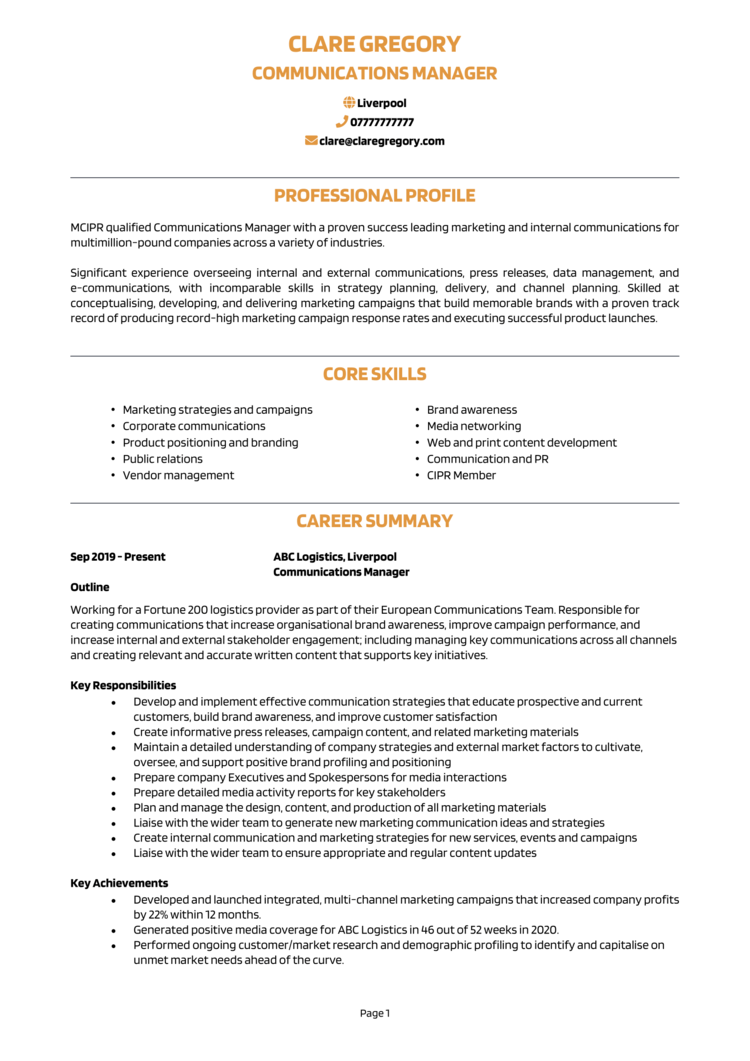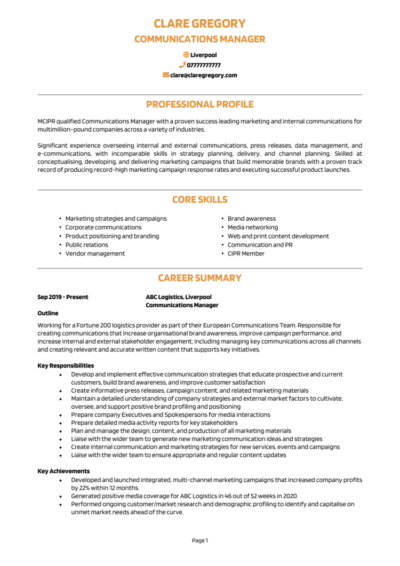You’re already used to making people stop, read, and respond – so writing a new CV should be a breeze, right?
Your skills shape how organisations speak to the world, but now it’s time to shape how you present yourself to employers.
This guide and its Communications Manager example CV will help you land that next career move.
Communications Manager CV

How to write your Communications Manager CV
Discover how to craft a winning Communications Manager CV that lands interviews with this simple step-by-step guide.
A great Communications Manager CV should emphasise the success you’ve made for companies. This guide breaks down exactly how to present your comms experience in a way that speaks to employers.
It’ll go step-by-step through writing a CV that captures your impact across industries and audiences in a clear and coherent way.
How to structure and format your Communications Manager CV


Seeing as you’re applying for a communications role, you should be as clear and engaging as you’re expected to be. A jumbled or unclear layout full of mistakes won’t just look bad, it’ll suggest you can’t present key information effectively. Make it as scannable and purposeful as a great press release to keep it engaging for prospective recruiters.
Here’s the structure to follow:
- Name and contact details – Display your contact details clearly at the top so employers can get in touch easily. Including a picture of yourself is entirely optional.
- Profile – Begin with a concise summary that highlights your expertise and what you bring to the role.
- Core skills – Highlight your strongest skills that align with the role’s requirements.
- Work experience – Start with your most recent role and work backwards, showcasing achievements and responsibilities.
- Education – Mention your degrees, certifications, and any training that supports your career path.
- Additional info – Include any additional details, like awards, professional memberships, or hobbies and interests that highlight your skills or personality.
Use bullet points in your experience section to break down dense information. Keep your CV formatting clean with logical headers, a readable font, and consistent spacing throughout. Aim for no more than two pages long. Just like any internal comms strategy – keep it focused and free of clutter.
How to write a Communications Manager CV profile


Your CV profile is your first and best chance to show the employer the value you bring – not just your skill set, but the outcomes you deliver. Whether you’re managing internal narratives or leading major media campaigns, this section should highlight the measurable difference your work makes.
Think of it as a concise pitch: what kind of comms leader are you, and what kind of transformation can an employer expect if they bring you in? It’s the first thing hiring managers will see, so make it count.
Communications Manager CV profile examples
Profile 1
Experienced Communications Manager with over 10 years of experience in corporate communications, public relations, and brand messaging. Skilled at developing internal and external strategies to enhance reputation, engage stakeholders, and manage media relations. Proven success delivering high-impact campaigns and crisis communications across global organisations.
Profile 2
Strategic Communications Manager with eight years of experience in the public and non-profit sectors. Adept at content creation, digital engagement, and stakeholder management. Confident leading cross-channel communications and delivering campaigns aligned with organisational goals. Proficient in CMS platforms, media monitoring tools, and analytics dashboards.
Profile 3
Versatile Communications Manager with five years of experience managing internal communications and change initiatives for large-scale companies. Strong background in writing, employee engagement, and leadership communications. Known for translating complex business updates into clear, compelling narratives that align with brand tone and voice.
Details to put in your Communications Manager CV profile
Make sure your profile includes the following:
- Where you worked – You may have worked in-house at large corporations, public sector organisations, or agencies delivering comms for multiple clients.
- Your top qualifications – You might hold a degree in Communications, PR, Journalism, or similar, alongside CIPR membership or professional development in digital comms or media relations.
- Essential skills – You could bring expertise in multi-channel strategy, crisis comms, stakeholder engagement, press management, internal comms, or brand messaging.
- Specialisms – You may have led high-impact PR campaigns, managed comms for change programmes, or overseen tone-of-voice development and implementation.
- Value delivered – In previous roles, you may have boosted engagement metrics, improved employee communication scores, raised positive media coverage, or managed reputational risk during sensitive campaigns.
What to include in the core skills section of your CV


This section needs to show your technical strengths and real-world capabilities – not just your passion for storytelling or team leadership. Focus on practical communication skills and tools that match the requirements of the role.
You might include experience managing media relations, drafting executive speeches, overseeing internal comms channels, or leading social media strategies. If you’ve used tools like SharePoint or Canva, mention them here. Showcase the tangible things you can do: a helpful tip is to copy the things mentioned in the job description.
What are the most important skills for a Communications Manager CV?
- Strategic Communications Planning – Developing and executing communication strategies that align with organisational goals and enhance brand messaging.
- Content Creation and Editorial Oversight – Producing high-quality written content for press releases, blogs, speeches, and internal communications.
- Media Relations and Press Management – Building relationships with journalists, pitching stories, and managing media enquiries and press coverage.
- Internal Communications Management – Designing and delivering messaging that informs, engages, and motivates employees across the organisation.
- Social Media Strategy and Execution – Overseeing social media presence, creating content calendars, and analysing engagement metrics.
- Crisis Communication and Reputation Management – Leading communication responses during crises and safeguarding the organisation’s public image.
- Stakeholder Engagement – Communicating effectively with internal and external stakeholders, including customers, investors, and partners.
- Brand Voice and Messaging Consistency – Ensuring all communication channels reflect a consistent tone and support brand identity.
- Campaign Development and Performance Analysis – Planning and launching communication campaigns and evaluating their effectiveness using KPIs.
- Cross-Functional Collaboration – Working with marketing, HR, legal, and executive teams to align messaging and support strategic initiatives.
How to write a strong work experience section for your CV


This section should show that you don’t just know how to communicate – you know how to get results. It’s about real campaigns to real audiences, and their measurable outcomes. For each role, give a short summary of your employer and your role there, then use bullet points to highlight your responsibilities and achievements.
List each role in reverse chronological order. Emphasise the scale of your work experience and be specific about the kind of content or campaigns you led. Results matter, so wherever you can, include engagement figures, response rates, media coverage numbers, or other metrics.
The best way to structure job entries on your CV

- Outline – Provide a brief intro to the organisation, your level of seniority, and how your work supported their communications objectives.
- Responsibilities – Use action words like “developed” and “led.” For example: “developed and executed external comms strategy for product launch across five regions” or “led content development for internal rebranding campaign reaching 3,000+ staff.” Mention tools, teams, and timelines.
- Achievements – Include evidence of what you achieved, such as press coverage secured, audience reach, improved engagement scores, or crisis situations handled effectively.
Sample jobs for Communications Managers
Communications Manager | Holloway Trust Group
Outline
Managed corporate communications and media strategy for a national charity, supporting brand awareness, stakeholder engagement, and public relations activity across multiple campaigns.
Responsibilities
- Developed and executed integrated communication plans across print, digital, and social channels
- Wrote press releases, speeches, and internal updates for senior leadership
- Built and maintained relationships with national and regional media contacts
- Led crisis communications and coordinated rapid response messaging
- Analysed campaign performance and presented reports to executive team
Achievements
- Increased media coverage by 40% year-on-year through proactive PR initiatives
- Secured national press for a major fundraising campaign, generating over £1.2M
- Improved internal newsletter engagement by 55% with revised content structure
Communications Manager | Teylan Technologies
Outline
Led all internal and external communications for a mid-sized tech company, ensuring consistent brand messaging and clear stakeholder engagement across global offices.
Responsibilities
- Crafted messaging for product launches, internal updates, and leadership communications
- Managed company intranet and authored weekly employee communications
- Oversaw media relations, awards submissions, and thought leadership content
- Collaborated with HR and IT teams on change communications and onboarding
- Maintained tone of voice and brand style guides across global offices
Achievements
- Supported a major internal restructure with 98% message comprehension rate in pulse survey
- Contributed to three industry awards by creating compelling submissions
- Improved onboarding communication materials, reducing new hire queries by 30%
Communications Manager | Wilcroft Financial
Outline
Oversaw communication strategy and corporate branding for a regional financial advisory firm, ensuring strong messaging across client communications and internal channels.
Responsibilities
- Developed marketing and communication plans for campaigns and service launches
- Managed digital content across website, social media, and email platforms
- Wrote client updates, press releases, and market commentary on behalf of leadership
- Liaised with compliance to review content and ensure regulatory alignment
- Ran internal communications for business updates, events, and policy changes
Achievements
- Grew company LinkedIn following by 60% in under 12 months through content planning
- Improved client open rates on newsletters from 28% to 49% with refreshed content strategy
- Reduced content approval time by 35% through streamlined workflow with compliance
How to list your educational history


Most communications professionals hold a relevant degree, but experience often carries more weight – especially at mid-senior level. Still, a strong academic background can demonstrate foundational skills in writing, media handling, and audience engagement.
Include your degree (e.g. Communications, Journalism, English), institution, and any postgraduate or vocational education or training. You might also mention short courses in strategic comms or stakeholder management if applicable.
What are the best qualifications for a Communications Manager CV?
- BA or MA in Communications, Public Relations, or Journalism – Offers formal training in message development, media relations, and audience engagement
- CIPR (Chartered Institute of Public Relations) Membership or CPD – Demonstrates ongoing commitment to professional standards
- Diploma in Internal Communications or Strategic Communications – Valuable for leading cross-channel internal campaigns
- Short courses in Digital Marketing, Social Media Management, or Content Strategy – Shows you’re equipped for modern comms environments
- Media Law or Crisis Communication Training – Important for roles involving reputational risk or press handling





